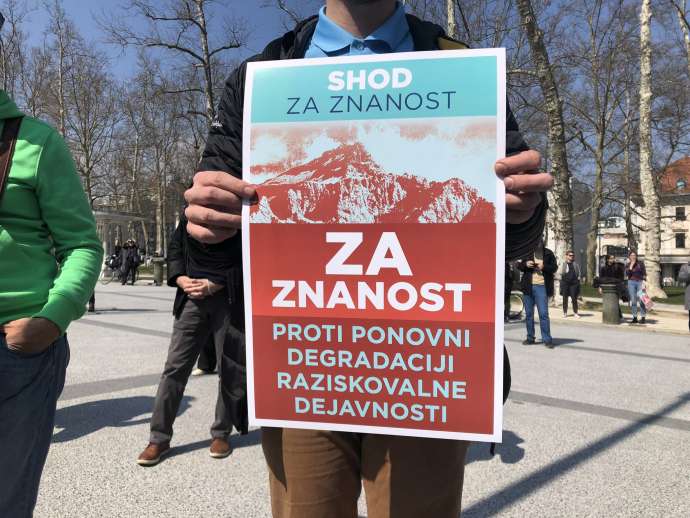STA, 6 April 2022 - Several hundred scientists gathered in the centre of Ljubljana on Thursday to protest against the transformation of private educational and research institutions into public entities eligible for public funds, a policy they say is driven by political interests rather than expert judgement.
"We cannot consent to the duplication of activities and irrational spending of hard-won funds via alternative routes instead of regular routes applicable to other scientific institutions," said Martina Lukšič Hacin, one of the Scientific Research Centre at the Slovenian Academy of Sciences and Arts (ZRC SAZU).
The protest, organised by the Chancellors' Conference and Coordinating Body of Slovenian Research Institutions, comes after the National Assembly passed in mid-March a bill transforming the Pomurje Academic and Science Union, led by an Education Ministry state secretary, into a public institution.
Just a week later, the government endorsed the creation of Rudolfovo, a research hub in Novo Mesto seen as a key step in the creation of a new public university in Novo Mesto run by staff with close ties to the government.
And today the National Assembly was due to vote on the transformation of a Novo Mesto faculty into a public institution, another planned piece of the Novo Mesto university, a step which has been temporarily derailed by a referendum motion lodged by the opposition.
The organisers of the rally demand that autonomy of science be respected, they want the National Research Agency, where there was recently a change of ownership, to have a "politically independent leadership", and they demand transparent distribution of public funds.
Gregor Majdič, the chancellor of the University of Ljubljana, Slovenia's largest public university, expressed concern about the formation of new public institutes and regional universities without any analysis or consultations.
"Slovenia still invests the lowest share of public funds in all of EU in science, development, innovation and higher education. We have to ask ourselves whether we are rational and responsible in the distribution of funds that are low as it is."
The Ministry of Education, Science and Sport responded by pointing to an increase in funding for science and research. It said this year they would increase by EUR 44.3 million or 13.7% to EUR 369 million, which was up 21.8% compared to realised funding in 2021.
The funding is to increase by an additional 7.2% in 2023 to EUR 395.6 million.
It said the goal was to earmark 1% of GDP in public funds for science and research with an annual growth rate of 0.08% of GDP. It added that budged funds for science wound double by 2025.
So far there have been 16 science and research institutes in Slovenia, of which 15 in Ljubljana and one in Koper, the ministry said, adding that only decentralisation in the field could activate as much potential as possible and create conditions conducive to applied research.
"The fear of the scientific research community that the creation of a new public research institution would jeopardise its current or future material situation is thus completely unnecessary, all the more so as funding for science will only increase in the years to come," the ministry's release reads.






